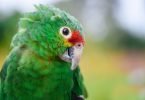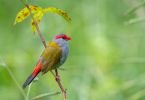Owning a pet is one of the most fulfilling experiences you can have. Birds, especially, are among the loveliest creatures to bring to your home. They are quite good companions. As a pet owner, you only want your birds to be safe in your protection at all times. Thus, it’s essential to find out more about diseases that your birds may be predisposed to. This is so you can properly help prevent your birds from contracting them. In this article, we discuss Psittacosis in Birds.
What is Psittacosis?
Psittacosis, also known as parrot fever, is an infectious disease that not only infects birds but other animals as well. It comes from the Greek word psittakos, which means parrot. Parrot Fever causes a lot of clinical manifestations such as eye swelling, lethargy, loss of appetite, among many others.
This disease may sound like a subtle illness, but that is not the case. Complications from the disease are fatal. Among the complications are liver inflammation, joint inflammation, as well as brain inflammation.
Psittacosis in birds has an incubation period of around 5-20 days, depending on the bird species and other factors. Within the first few days, the bird will show signs and symptoms akin to the flu. This may be in the form of high fever, diarrhea, lack of energy, and redness or inflammation of the eye.
To know more about common health problems in birds, click this article Bird Health Problems – What You Need to Know About the Types, Treatments, Symptoms, and Prevention.
What causes Psittacosis in birds?
Psittacosis in birds is caused by the bacterium Chlamydia psittaci. Avian chlamydiosis is also another term used. It was taken from the name of its infectious agent. It’s essential to make the distinction between Chlamydia psittaci and Chlamydia trachomatis. The latter is the one that causes the sexually transmitted disease chlamydia in humans. It is not transmissible to birds. Meanwhile, Chlamydia psittaci can both infect humans and different species of birds.
Apart from Chlamydia psittaci, other species can also cause Psittacosis in birds. It includes species like Chlamydophila avium and Chlamydia gallinacea. Other animals, like horses and sheep, can also be infected.
How does a bird get Psittacosis?
Psittacosis-causing bacteria is highly transmissible in multiple ways. The most common route of infection is via respiration. Inhalation of fecal particles can quickly transmit the bacteria causing Psittacosis. It can also be through inhaling feather dust or respiratory secretions of other infected animals.
What are the symptoms of Psittacosis in birds?
Initially, the disease course of Psittacosis is not highly specific. Within several days from infection, the bird will experience high fevers. Furthermore, other symptoms such as conjunctivitis (eye inflammation) and diarrhea can also be experienced.
It’s important to note that some birds infected with the bacteria may not show any signs and symptoms. Thus, appearing healthy doesn’t mean that the bird is not infected with C. psittaci.
How do you diagnose Psittacosis in birds?
C. psittaci should be isolated to make the diagnosis of Psittacosis in birds. Serologic testing, blood tests, and cultures all contribute to making a thorough diagnosis. This bacterium can also be demonstrated in avian tissue. In this histologic test, your vet will perform a biopsy. After that, doctors can visualize the tissue under the microscope to look for the bacteria.
The bacteria reside in various parts of the bird’s body. It includes the liver, lungs, eyes, spleen, kidneys, as well as the gastrointestinal tract. This is why any fecal matter or nasal, oral secretions can transmit the disease to other animals and humans.
The mere presence of the bacteria in the stool doesn’t mean that the bird is suffering from the disease. It may only mean that the bird is a carrier. Thus, clinical signs and symptoms should be correlated with laboratory tests.

Can Psittacosis in birds be cured?
Luckily, Psittacosis in birds is highly curable. It’s great that we already know the exact cause of this disease. It makes the management and treatment of Psittacosis in birds a lot easier.
However, according to reports, 50% of birds infected die. It is due to the lack of proper diagnosis and treatment. This is why it’s important to immediately bring your pet to the vet if it’s showing signs and symptoms.
With proper treatment, many birds recover from Psittacosis. There is no need to panic if your bird is manifesting some of the signs and symptoms of Psittacosis in birds.
How do you treat a bird with Psittacosis?
Antibiotics can effectively treat bacterial infections, such as Psittacosis. Typically, your veterinarian will prescribe your bird with Doxycycline. Depending on the severity, your vet may prescribe for you to give for up to 45 days.
Doxycycline belongs to the tetracycline class of antibiotics. This may already sound familiar to you. It is because doctors prescribe Doxycycline for various infections. This includes acne, pneumonia, and other zoonotic diseases. It acts by inhibiting the protein synthesis of the bacterium C. psittaci.
You may notice that the course of treatment is very long compared to other bacterial diseases. This is because the bacterium Chlamydia is very difficult to target. They usually hide in the blood cells called macrophages. Thus, the antibiotic should wait until the bacteria are released from these cells until they can attack them.
Thus, it is essential to comply with the antibiotic course strictly. Failing to do so may induce antibiotic resistance. Furthermore, improper treatment administration proves to be harmful. Your bird might go on to develop severe complications.
It is important to refrain from self-medication if you suspect your bird to have Psittacosis. Always consult with your veterinarian before giving any medications.
How to prevent Psittacosis in birds?
As with any kind of disease, prevention is always better than cure. It is bacteria that causes Psittacosis in birds. Hence, the primary thing pet owners can do is to keep the bird’s living conditions as clean as possible. It should not only be done when your bird is sick. Always observe proper hygiene regardless of your bird’s health. This is for you and your bird’s sake.
Cleaning your bird’s cage becomes quick and convenient with cleaning wipes. This is ideal for those who are always on-the-go and can’t find time to do regular cleaning. Cleaning wipes are easy to use and toss. However, you should not use this method for a long time.
How do you maintain a clean environment for birds?
Of course, the ideal way to do so is still to scrub down and wash the cage manually. Make sure to use gentle, non-toxic, but effective bird cage cleaners when you’re dealing with the feces. Stay away from highly potent and toxic cleansers as they may be harmful to your birds.
For easy cleaning, you can also use bird cage liners. It will lessen the time you need to make sure your bird’s cage is free from dirt, feathers, and feces. Just simply replace the liners whenever they are highly soiled. Throw them properly and wash your hands after handling them.
To further ensure the cleanliness of your bird’s cage, you can install a mess-free bird food dispenser. With this tool, birdcage cleaning will be much easier and faster — no need to worry about spilled seeds and pellets all over the cage.
Use a stain remover if you’re having trouble removing some old dried up feces and stains on the birdcage. You can also use them on various surfaces such as upholstery, linen, and carpets. You can also use cleaning brushes to speed up the process.
Keeping your bird’s immune system at its high is one thing you can do to prevent Psittacosis. You can do so by making sure you’re regularly feeding your birds at the right time. However, it’s not enough to feed your birds. Properly nourishing them with foods enriched with vitamins and minerals is essential to help boost their immune system. Proper nutrition is one of the foundations of a good immune system.
You can also give your birds some vitamins and minerals to help with their immune system. You can simply add them to your bird’s water or food.
Bringing a New Bird Home
If you’re planning on bringing a new bird to the family, quarantine the new bird first before introducing it to your old one. This is so you can avoid spreading the disease if your new one has it.
Don’t forget to protect yourself also. Make sure to wear gloves and mask when handling fecal material. Protect yourself during bird cage cleaning. If you feel like your bird is sick, protect yourself as well. In some cases, humans contract Psittacosis from infected birds.
Lastly, make sure to visit your bird’s veterinarian for check-ups regularly. It is always better to spot the disease early on because the chances of cure are a lot higher.
Wrapping Up
Psittacosis in birds is a serious medical illness that needs tending to as quickly as possible. Doing your research is helpful. However, taking your bird to the veterinarian will be in your best interest. Your bird’s doctor is the only one who can make the right diagnosis and provide the right management. As with any disease, it’s better to prevent it from happening rather than cure it.
To know more about common health problems in birds, click this article Bird Health Problems – What You Need to Know About the Types, Treatments, Symptoms, and Prevention.






